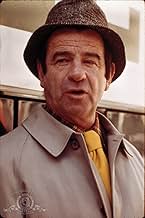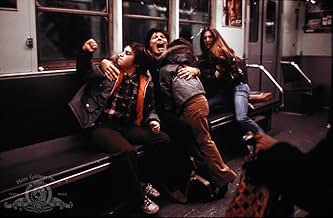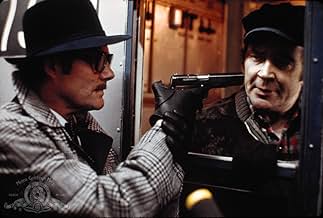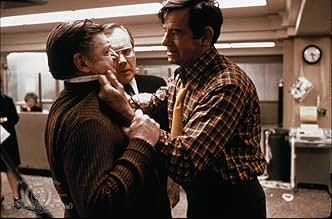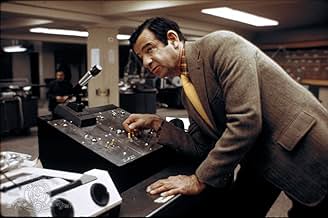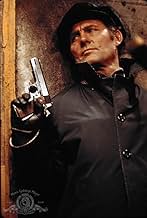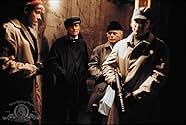Il colpo della metropolitana - Un ostaggio al minuto
Si tratta del sequestro di un convoglio della metropolitana Newyorkese pieno di passeggeri che si ritrovano ostaggi di una congiura terroristica. Mentre la metropolitana prosegue la sua cors... Leggi tuttoSi tratta del sequestro di un convoglio della metropolitana Newyorkese pieno di passeggeri che si ritrovano ostaggi di una congiura terroristica. Mentre la metropolitana prosegue la sua corsa, l'orrore e la realtà di una tale azione diventano sempre più tragicamente evidenti.Si tratta del sequestro di un convoglio della metropolitana Newyorkese pieno di passeggeri che si ritrovano ostaggi di una congiura terroristica. Mentre la metropolitana prosegue la sua corsa, l'orrore e la realtà di una tale azione diventano sempre più tragicamente evidenti.
- Nominato ai 2 BAFTA Award
- 3 candidature totali
- Borough Commander
- (as Kenneth Mc Millan)
Recensioni in evidenza
The cat of course is led by Walter Matthau who plays a Transit Police Lieutenant. His character is a kind of combination of Archie Bunker and Detective Lennie Briscoe from Law and Order, in many ways not terribly admirable. He's also a transit cop and at that time the Transit Police were a separate entity. They were merged into the regular NYPD during the Giuliani administration.
There's no real glory in the Transit Police, these guys were mostly charged with dealing with drunks and kids with loud boom boxes. If a homicide ever occurred the NYPD quickly took it over as they would in most situations. But this ongoing crisis on a train on the Lexington Avenue Local occurs on his watch and it's career make or break case that Matthau is very aware of. And he proves fully capable during the crisis.
The crisis is four men, Robert Shaw, Earl Hindman, Hector Elizondo, and Martin Balsam mount a carefully planned assault on a subway train out of Pelham Bay station in the Bronx in mid-Manhattan and hold it and the passengers for ransom for a million dollars. The outsider to New York is Robert Shaw in one of his best roles, a former British army officer and mercenary. During the course of the robbery they kill a station supervisor played by roly poly Tom Pedi, one very quintessential New Yorker and their coldblooded villainy is established.
In fact the whole cast is a microcosm of the ethnic strains of New York City which makes the film so enjoyable, especially to one who lived there, the first 49 years of his life. Even the mayor is portrayed as a weak, fumbling nonentity and back then our mayor was one Abraham D. Beame who was just that, probably one of the worst mayors the city ever had. Tony Roberts has a very good role as the tough as nails Deputy Mayor concerned about both his boss's political career and resolving the crisis.
The Taking of Pelham One Two Three once the hijack is done is suspense filled and doesn't let up for a moment. I can't give the ending away, but the final shot of Walter Matthau's face as the end title music starts and the credits begin to roll is priceless.
Leading the hijackers is Robert Shaw, whose cold, calculating Mr. Blue is truly chilling; on the side of the law is Transit Police Lt. Zachary Garber, played by Walter Matthau, whose job it is to converse with the criminals whilst trying to figure out who they are and how they plan to make their escape. Much of the movie consists of exchanges of dialogue between the two men, but don't make the mistake of thinking this is a dull blab-fest: the tension runs high throughout, the race to deliver the ransom money against the clock being a particularly exciting highlight. And with one of the hijackers a dangerous loose cannon (Hector Elizondo's Mr. Grey, surely the inspiration for Michael Madsen's Mr. Blonde), the potential for the loss of innocent life is ever present.
A thrilling final act sees the train speeding out of control with the terrified passengers still on board, the gang having disembarked between stations. Meanwhile, Garber and his men tighten the net, and one-by-one the hijackers pay for their crime, with one death proving very shocking indeed. The fun continues right up to the final frame, an amusing ending that is nothing to be sneezed at.
Don't bother catching this film on TV. It's always completely hacked up. Rent it or buy the DVD. It will remind you just how much fun movies used to be.
Still a wonderful piece of filmmaking, Robert Shaw perfectly cast as Mr. Blue, the exchanges between him and Walter Matthau as Garber outstanding, all encompassed in a more than believable story that travels without interruption, all the way to the end of the line.
Which brings us to pacing – the pacing in this picture is excellent. It moves right along and never stops, never slows, never goes too fast. This is the strongest element of its success.
Another strength is its economy of motion. Many action pictures bore us with unneeded car chase scenes, shoot-em-ups, explosions and other mayhems that are used as filler when true creativity comes up short. This film needs none of that. Only that which is necessary is shown. Only that which needs speaking is spoken. This film is deftly written and crafted with great economy and this underpins the excellent pacing. It moves right along because there is no wasted motion as there is in most other action pictures.
This does not mean there is no action, there is fabulous action, but only such action as is necessary to move the plot along. There is no action simply to occupy time until the requisite 90 minutes are up.
The directing is equally economical. No fancy shots, shaky cameras, or special effects – just good, straight forward directing.
I doubt this picture could be made today for the above reasons. The script readers would reject it for 'lack of development'; 'not enough action'; 'no romantic interest'; and all the other brainless formulas script readers dole out. The producers would demand 'more action' and 'camera work' from the directors. And, of course, a romantic interest (in some state of undress) would have to be shoe horned in.
Film students should study this picture. From it they will learn that brevity is a virtue and mindless formulas are just that - mindless.
Lo sapevi?
- QuizIn a TVO (Ontario, Canada) interview, the producer said that this film did terrific box office in New York, Toronto, London and Paris--all cities with subways--but was considered a flop in the rest of the world.
- BlooperThe relevant section of the Lexington Avenue Line includes curves sharp enough to have speed-controlled signals. As Mr. Green would have known, these cannot be cleared to green in advance of the train's arrival and will not clear if it is running away.
- Citazioni
Lt. Garber: [looking for the inspector] Inspector Daniels?
Inspector Daniels: [identifying himself] Daniels.
Lt. Garber: [realizing that Inspector Daniels is Black] Oh, I, uh, thought you were, uh, like a shorter guy or... I don't know what I thought.
- Curiosità sui creditiAlthough many of the scenes in this film were taken on transit property, the New York City Transit Authority is not responsible for plot, story and characters portrayed. The Authority did not render technical advice and assistance.
- ConnessioniEdited into Superman III (1983)
I più visti
Dettagli
- Data di uscita
- Paese di origine
- Lingue
- Celebre anche come
- Il colpo della metropolitana (Un ostaggio al minuto)
- Luoghi delle riprese
- Gracie Mansion, Manhattan, New York, New York, Stati Uniti(mayor's home - exteriors)
- Aziende produttrici
- Vedi altri crediti dell’azienda su IMDbPro
Botteghino
- Budget
- 5.000.000 USD (previsto)
- Lordo in tutto il mondo
- 357 USD


